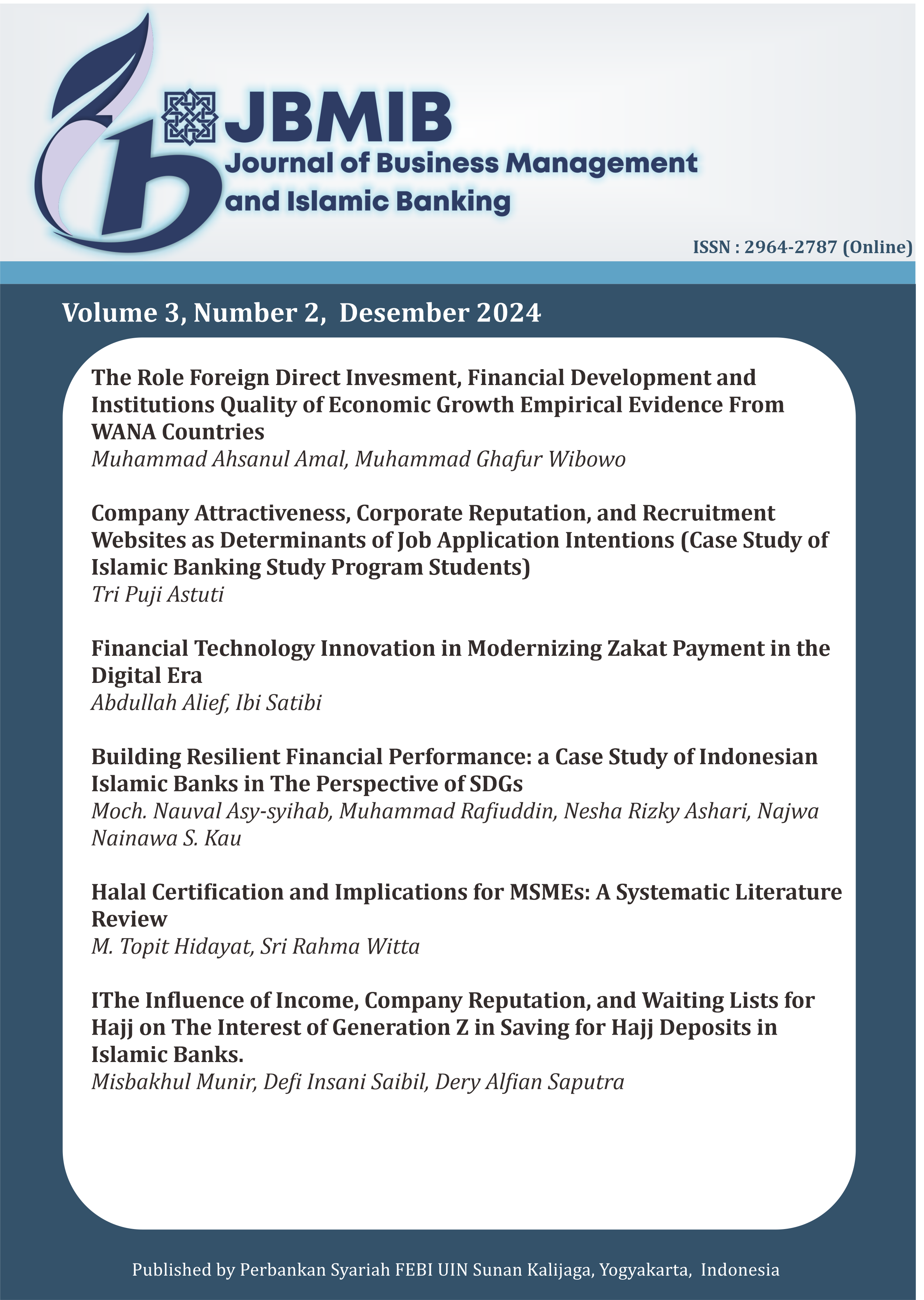The Role Foreign Direct Invesment, Financial Development and Institutions Quality of Economic Growth Empirical Evidence From WANA Countries
DOI:
https://doi.org/10.14421/jbmib.v3i1.2343Keywords:
Foreign Direct Invesment, Financial Development, Institution Quality and WANA CountriesAbstract
Research Aims: The study investigates the impact of foreign direct investment, financial development, and institution quality on economic growth in nations located in western Asia and North Africa
Methodology: This study methodology employs a panel data regression model using a fixed effect model (FEM) strategy. The study data is collected using the information that was available between the years 2000 and 2022. The WANA nations include Saudi Arabia, Iran, Israel, Jordan, Kuwait, Lebanon, Morocco, Egypt, Oman, Qatar, Tunisia, and the United Arab Emirates.
Research Findings: The findings indicated that foreign direct investment (FDI), financial development (FD), and intellectual quotient (IQ) had an impact on economic growth. Specifically, foreign direct investment (FDI) has a beneficial and statistically substantial impact on economic development, but the quality of institutions has an adverse and statistically substantial impact on economic growth. However, financial development does not affect economic growth.
Originality: The grand theory used in this research Economic Growth, Foreign Direct Investment, Institutions Quality, Financial Development, and Export and population growth variables are controlled. variables in this study by testing three variables consisting of independent variables, dependent variables and control variables.
Research limitation and implication: The findings in this study suggest that policies implemented by governments, public institutions and academics aimed at increasing FDI, FD, and institutional quality can help improve economic growth in WANA countries.
References
Abaidoo, R., & Agyapong, E. K. (2022). Financial development and institutional quality among emerging economies. Journal of Economics and Development, 24(3), 198–216. https://doi.org/10.1108/JED-08-2021-0135
Abaidoo, R., & Agyapong, E. K. (2023). Regulatory policy uncertainty, banking industry innovations and financial development among emerging markets. Journal of Financial Economic Policy, 15(6), 613–627. https://doi.org/10.1108/JFEP-07-2023-0180
Abuzayed, B., & Al-Fayoumi, N. (2016). Bank concentration, institutional quality, and economic growth: empirical evidence from MENA countries. Review of International Business and Strategy, 26(2), 219–231. https://doi.org/https://doi.org/10.1108/RIBS-01-2014-0008
Acemoglu, D., Johnson, S., & Robinson, J. A. (2005). Institutions As A Fundamental Cause Of Long-Run Growth. Handbook of Economic Growth, 1, 385–472. https://doi.org/10.1016/S1574-0684(05)01006-3
Acemoglu, D., & Robinson, J. (2010). The Role of Institutions in Growth and Development. Review of Economics and Institutions, 1, 1–44.
Acharya, V., Amihud, Y., & Litov, L. (2014). Financial regulation, risk taking, and financial stability. Journal of Financial Economics, 112(2), 313–345.
Addi, H. M., & Abubakar, A. B. (2022). Investment and economic growth: do institutions and economic freedom matter? International Journal of Emerging Markets. https://doi.org/https://doi.org/10.1108/IJOEM-07-2021-1086
Adeel-farooq, R. M., Bakar, N. A., & Raji, J. O. (2020). Financial sector development and economic growth: a co-integration analysis for ASEAN countries. International Journal of Economic Policy in Emerging Economies, 13(3), 195–208. https://doi.org/https://doi.org/10.1504/IJEPEE.2020.109056
Akhter, R., & Hasan, S. B. (2018). Foreign Direct Investment in Bangladesh : Prospects and Challenges. Journal of Economics and Sustainable Development, 9(9), 25–32.
Amighini, A. A., McMillan, M. S., & Sanfilippo, M. (2017). FDI and Capital formation Formation ini devekoping Economies. Nasitional, Bubeau 0f Economic Reserch, 1–38. https://doi.org/10.3386/w23049
Aslam, F. N., & Rudatin, A. (2022). Analisis determinan aliran Foreign Direct Investment (FDI) di kawasan ASEAN. Jurnal Kebijakan Ekonomi Dan Keuangan, 1(2), 205–211. https://doi.org/10.20885/JKEK.vol1.iss2.art7
Assadzadeh, A., & Pourqoly, J. (2013). The Relationship between Foreign Direct Investment , Institutional Quality and Poverty: Case of MENA Countries. Journal of Economics, Business and Management, 1(2), 161–165. https://doi.org/10.7763/JOEBM.2013.V1.35
Aziz, M. N., & Sundarasen, S. D. D. (2015). The Impact of Political Regime and Governance on ASEAN Economic Growth. Journal of Southeast Asian Economies, 32(3), 375–389. https://doi.org/10.1355/ae32-3e
Barra, C., & Falcone, P. M. (2023). Cross country comparisons of environmental efficiency under institutional quality . Evidence from European economies. Journal of Economic Studies, 1–37. https://doi.org/10.1108/JES-05-2023-0264
Bayar, Y., Borozan, D., & Gavriletea, M. D. (2020). Banking sector stability and economic growth in post-transition European Union countries. International Journal of Finance & Economics, 26(1), 949–961. https://doi.org/10.1002/ijfe.1829
Beck, T., Demirgüç-Kunt, A., & Levine, R. (2017). Finance and growth: New evidence for the 21st century. Journal of Economic Growth, 22(1), 47–82.
Bigliardi, B., Ferraro, G., Filippelli, S., & Galati, F. (2021). The past, present and future of open innovation. European Journal of Innovation Management, 24(4), 1130–1161. https://doi.org/10.1108/EJIM-10-2019-0296
Durusu-ciftci, D., Ispir, M. S., & Yetkiner, H. (2016). Financial Development and Economic Growth: Some Theory and More Evidence. Journal of Policy Modeling, 39(2), 290–306. https://doi.org/10.1016/j.jpolmod.2016.08.001
Edwards, J. A., Naanwaab, C. B., & Romero, A. A. (2017). Effect of FDI on Real Per Capita Gdp Growth: A Rolling Window Panel Analysis Of 60 Countries, 1982-2011. Applied Econometrics and International Development, 17(1), 19–38.
Gammeltoft, P., & Cuervo-Cazurra, A. (2021). Enriching Internationalization Process Theory Insights from the Study of Emerging Market Multinationals. Journal of International Management, 27(3), 100884. https://doi.org/10.1016/j.intman.2021.100884
Ghardallou, W., & Sridi, D. (2020). Democracy and Economic Growth : a Literature Review. Journal of the Knowledge Economy, 11, 982–1002. https://doi.org/https://doi.org/10.1007/s13132-019-00594-4
Guru, B. K., & Yadav, I. S. (2019). Financial development and economic growth : panel evidence from BRICS. Journal of Economics, Finance and Administrative Science, 24(47), 113–126. https://doi.org/10.1108/JEFAS-12-2017-0125
Herwartz, H., & Walle, Y. M. (2014). Determinants of the link between fi nancial and economic development: Evidence from a functional coefficient model. Economic Modelling, 37, 417–427. https://doi.org/10.1016/j.econmod.2013.11.029
Heydarian, S., Pahlavani, M., & Mirjalili, S. H. (2021). Financial Sanctions and Economic Growth : An Intervention Time-series Approach. International Economic Studies, 51(1), 1–14. https://doi.org/https://doi.org/10.22108/IES.2020.122915.1083
Hook, S., & Singh, N. (2014). Does too much finance harm economic growth ? JOURNAL OF BANKING FINANCE, 41, 36–44. https://doi.org/10.1016/j.jbankfin.2013.12.020
Ibrahim, M., & Alagidede, P. (2018). Effect of Financial Development on Economic Growth in sub-Saharan Africa. Journal of Policy Modeling, 40(6), 1104–1125. https://doi.org/10.1016/j.jpolmod.2018.08.001
Jhingan, M. . (2011). The economics of development and planning. 40th ed. Delhi: Vrinda Publication.
Jhingan, M. L. (2004). Ekonomi Pembangunan dan Perencanaan”. Terjemahan oleh D. Guritno. Edisi ke-1. Jakarta : PT. Raja Grafindo Persada.
Jolliffe, I. T. (2002). Principal Component Analysis, 2nd ed. Springer-Verlag, New York, NY.
Kamrunnahar, Mitra, S., & Khan, M. A. (2015). Effect Of Foreign Direct Investment on Gdp, Export And Domestic Investment : Bangladesh Perspective. Journal of Innovation & Development Strategy (JIDS), 9(2), 53–61.
Lee, C., & Shin, M. J. (2020). Do Women Favor Foreign Direct Investment ? Politics & Gender, 16, 525–551. https://doi.org/10.1017/S1743923X18001058
Levine, R. (1997). Financial Development and Economic Growth : Views and Agenda. Journal of Economic Literature, 35(2), 688–726. https://www.jstor.org/stable/2729790
Li, C., & Tanna, S. (2019). The impact of foreign direct investment on productivity: New evidence for developing countries. Economic Modelling, 80, 453–466. https://doi.org/https://doi.org/10.1016/j.econmod.2018.11.028
Maciejewski, M., & Głodowska, A. (2020). Economic development versus the growing importance of the financial sector: Global insight. International Entrepreneurship Review, 6(3), 77–90. https://doi.org/https://doi.org/10.15678/IER.2020.0603.06
Mankiw, N. G. (2010). Macroeconomics, edisi 7th. Worth Publishers. United States of America. https://www.ptonline.com/articles/how-to-get-better-mfi-results
Mello, L. R. De. (1997). Foreign direct investment in developing countries and growth: A selective survey. The Journal of Development Studies, 34(1), 1–34. https://doi.org/10.1080/00220389708422501
Mian, A. R., Sufi, A., & Verner, E. (2013). The great reversal: The politics of financial development in the twentieth century. Princeton University Press.
Muhammad, N., Islam, A. R. M., & Marashdeh, H. A. (2016). Financial development and economic growth: an empirical evidence from the GCC countries using static and dynamic panel data. Journal of Economics and Finance, 40, 773–791. https://doi.org/10.1007/s12197-015-9331-9
Nadzir, M., & Kenda, A. S. (2023). Investasi Asing dan Investasi Dalam Negeri : Pengaruhnya pada Pertumbuhan Ekonomi di Indonesia. JIMAT (Jurnal Ilmiah Mahasiswa Akuntansi )), 14(1), 317–328.
Nawaz, S., Iqbal, N., & Khan, M. A. (2014). The Impact of Institutional Quality on Economic Growth : Panel Evidence. The Pakistan Development Review, 53(1), 15–31. https://www.jstor.org/stable/24397923
Ni, B., Spatareanu, M., Manole, V., Otsuki, T., & Yamada, H. (2017). The Origin of FDI and Domestic Firms’ Productivity—Evidence from Vietnam. Journal of Asian Economics, 52, 56–76. https://doi.org/10.1016/j.asieco.2017.08.004
North, D. C. (1990). Institutions, Institutional Change and Economic Performa. Cambridge University Press.
North, D. C., & Thomas, R. P. (1973). The Rise of the Western World: A New Economic History. Cambridge University Press.
Ogbuabor, J. E., Orji, A., Manasseh, C. O., & Anthony-orji, O. I. (2020). Institutional Quality and Growth in West Africa : What Happened after the Great Recession? International Advances in Economic Research, 26(4), 343–361. https://doi.org/https://doi.org/10.1007/s11294-020-09805-0
Orji, A., Ogbuabor, J. E., Nwosu, E., Anthony-Orji, O. I., & Isaac, S. T. (2019). Financial Development, human capital and economic growth in Nigeria: an empirical analysis. Journal of Academic Research in Economics, 11(3), 507–531.
Paweenawat, S. W. (2019). Foreign Direct Investment and Wage Spillover in Thailand Evidence From Firm-Level Panel Data. International Journal of Social Economics, 46(10), 1198–1213. https://doi.org/10.1108/IJSE-01-2019-0055
Pham, T. K. T. (2023). Impacts of national intellectual capital on informal economy: the moderating role of institutional quality. Competitiveness Review, ahead-of-p(ahead-of-print). https://doi.org/https://doi.org/10.1108/CR-03-2023-0047
Porta, R. La, Lopez-de-Silanes, F., Shleifer, A., & Vishny, R. W. (1998). Law and finance. Journal of Political Economy, 106(6), 1113–1155.
Pradhan, R. P., Arvin, M. B., Bahmani, S., Hall, J. H., & Norman, N. R. (2017). Finance and growth : Evidence from the ARF countries. Quarterly Review of Economics and Finance, 66(136–148), 1–13. https://doi.org/10.1016/j.qref.2017.01.011
Salman, M., Long, X., Dauda, L., & Nyarko, C. (2019). The impact of institutional quality on economic growth and carbon emissions : Evidence from Indonesia , South Korea and Thailand. Journal of Cleaner Production, 241, 118331. https://doi.org/10.1016/j.jclepro.2019.118331
Schumpeter, J. A. (1911). The theory of economic development. Cambridge, MA: Harvard University Press.
Shabbir, M. S., Bashir, M., Abbasi, H. M., Yahya, G., & Abbasi, B. A. (2020). Effect of domestic and foreign private investment on economic growth of Pakistan. Transnational Corporations Review, 0(0), 1–13. https://doi.org/10.1080/19186444.2020.1858676
Solow, R. M. . (1956). A Contribution to the Theory of Economic Growth. The Quarterly Journal of Economics, 70(1), 65–94. https://www.jstor.org/stable/1884513
Uddin, M. A., Ali, M. H., & Masih, M. (2021). Institutions , human capital and economic growth in developing countries. Studies in Economics and Finance, 38(2), 361–383. https://doi.org/10.1108/SEF-10-2019-0407
Ullah, I., & Khan, M. A. (2017). Institutional quality and foreign direct investment inflows: evidence from Asian countries. Journal of Economic Studies, 44(6), 1030–1050. https://doi.org/10.1108/JES-10-2016-0215
Uwubanmwen, A., & Omorose, O. (2016). Foreign Direct Investment and Economic Growth : Evidence from Nigeria. International Journal of Business and Social Science, 7(3), 89–103.
Wulan, D., Noor, S., Khalifah, A., & Suyanto, S. (2016). The spillover effects of foreign direct investment on the firms’ productivity performances. Journal of Productivity Analysis, 46, 199–233. https://doi.org/10.1007/s11123-016-0484-0
Xede, J., Simon, C., Dak-adzaklo, P., Ofosu, E., Wise, S., & Adza, D. (2023). Journal of International Financial Markets , Competition laws , external financing and investment. Journal of International Financial Markets, Institutions & Money, 82, 101700. https://doi.org/10.1016/j.intfin.2022.101700
Yu, S., & Jong-a-pin, R. (2019). Rich or alive ? Political (in) stability, political leader selection and economic growth. Journal of Comparative Economics, 48(3), 561–577. https://doi.org/10.1016/j.jce.2019.11.004
Zimon, G., Arianpoor, A., & Salehi, M. (2022). Sustainability Reporting and Corporate Reputation : The Moderating Effect of CEO Opportunistic Behavior. Sustainability, 14, 1–28. https://doi.org/https://doi.org/ 10.3390/su14031257
Downloads
Published
Issue
Section
License
Copyright (c) 2024 Journal of Business Management and Islamic Banking

This work is licensed under a Creative Commons Attribution-ShareAlike 4.0 International License.












